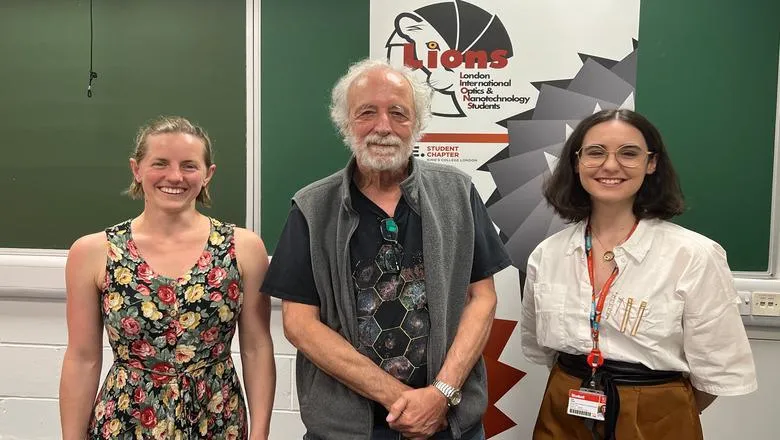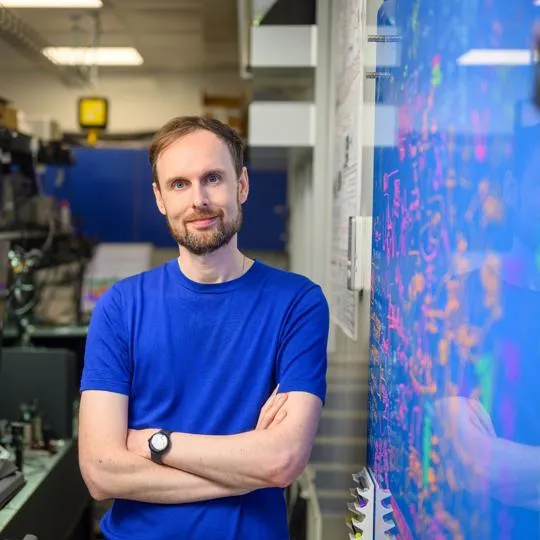I would say to anyone doing a PhD now to talk to their peers, keep an open mind and think about the fundamentals – don’t think about the applications yet because good science comes from fundamentals.”
Professor Pierre Agostini
22 July 2024
“My advisor told me not to do it – I did it anyway!” Nobel laureate tours King's
Pierre Agostini, 2023 Nobel Prize Winner for Physics, shares meditations on fame in science and the future of attosecond physics.

The 2023 joint Nobel Prize Winner for Physics, experimental physicist Professor Pierre Agostini, visited the Department of Physics last week during a trip to the UK.
Best known for his pioneering work in laser and attosecond physics, a branch of science that uses short pulses of light to study matter, Agostini received the Nobel alongside Anne L'Huillier and Ferenc Krausz for the first “attosecond pulses of light” used to study electrons.
While at King’s, the avid reader and listener of jazz was interviewed for a podcast with the King’s chapter of SPIE, the International Society for Optics and Photonics.
Speaking with PhD student Anne Weber and new graduate Elena Liberti, he spoke about his memory of not getting the call from the Nobel Prize Committee:
“I didn’t actually receive the call for the Nobel Prize. The committee thought I was in Columbus, Ohio where I’m a Professor Emeritus, but I was in Paris at the time. I did have a call with the head of the Nobel Committee in the end, but before that I got the news from my daughter, who called me furious that she had found out on YouTube and that I hadn’t told her!”
Describing his long route to 2023 and his entry to the field, the Nobel prize winner said, “A colleague of mine when he saw me at a conference in 2023 described winning a Nobel as ‘going from the status of a physicist to the status of God’ and for a month and a half I had to look at a larger than life photo of my own face on the physics research building of Ohio State.
“But I didn’t want to do physics at first, I wanted to do maths! But at university I was told it was too difficult for me. When, now an old friend, asked me if I wanted to study photonics with him (the study of light) my advisor told me not to do it – but I did it anyway! It’s been a long road to the attosecond.”
Professor Agostini also meditated on the need for fundamental science in his advice for PhD students, saying “I would say to anyone doing a PhD now to talk to their peers, keep an open mind and think about the fundamentals – don’t think about the applications yet because good science comes from fundamentals.”

He ended with a nod to the future of the field, “Combining quantum physics with attosecond physics is exciting, I don’t know if people will like it, but attochemistry and charge migration will be important too. I’m also looking forward to what’s beyond the attosecond, the zeptosecond, but maybe you guys can find that!”
Professor Agostini was taken on a tour of the photonics and levitation labs and had an Afternoon Tea in his honour. Following a series of talks by scientists from inside King’s, wider London and the French Embassy, he then spent the rest of the event talking to individual students and signing autographs.
Of Agostini’s visit, which she organised, Dr Amelle Zaïr said, “When I was a PhD student my supervisor told me to be like Pierre, now at King’s we’ve had the honour of several Nobel Prize winners for attosecond physics coming through our doors.
When I asked Pierre to come and inspire the next generation of physicists he agreed instantly. This visit is about the science yes, but it is fitting that the first person to measure an attosecond would be so invested in those whose time is after our own.”
Dr Amelle Zaïr
“When I asked Pierre to come and inspire the next generation of physicists he agreed instantly. This visit is about the science yes, but it is fitting that the first person to measure an attosecond would be so invested in those whose time is after our own.”
Dr James Millen, Director of King’s Quantum, said of the legacy of attosecond physics, “Quantum science, what we hope in the future will transform our healthcare systems and the way we protect our data, can sometimes feel like a black box because we don’t know for certain how the particles function. Attosecond pulses and Pierre’s experiments help make that black box light and ensure the future isn’t dependent on us searching around in the dark.”


